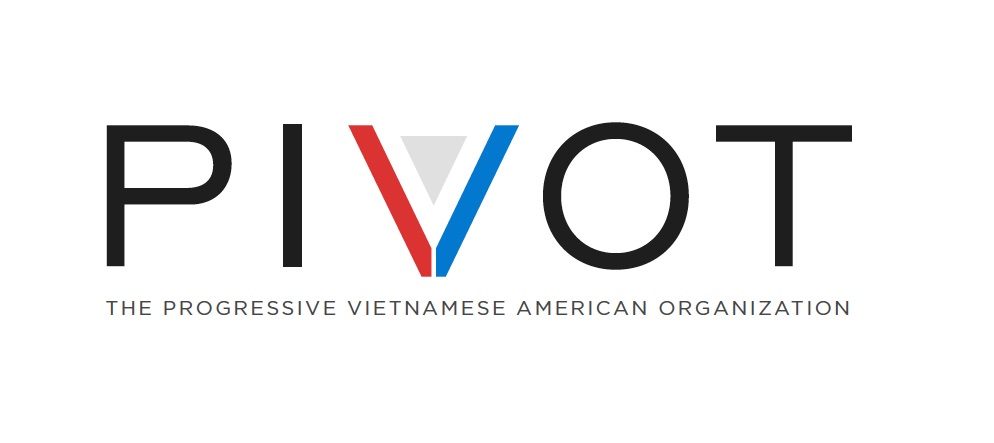Philip Nguyen
/Philip Nguyen, the co-chair of our Young Vietnamese Americans (YVA) Committee, was born and raised in Southern California. He recently graduated from UC Berkeley (go Bears!) in Ethnic Studies and Asian American Studies. Philip, who will be starting graduate school this fall to pursue a Masters in Asian American Studies at San Francisco State, hopes to become a professor. He has spent a lot of time with student and community organizations that support the educational attainment and development of underprivileged AAPI youth and their pursuit of higher education. He is also a big fan of AAPI media and Vietnamese American literature. His favorite book is a memoir titled I Love Yous Are for White People by Lac Su.
Why did you join PIVOT?
I joined PIVOT because I wanted to be a part of something bigger than myself in service to my community. PIVOT provided me with the opportunity to connect with and learn from like-minded Vietnamese Americans about what progressive change looks like in our current political landscape in the United States and to contribute to the empowerment our community through civic engagement and advocacy.
What do you wish to accomplish with PIVOT?
I hope to encourage and inspire my young Vietnamese American peers to take action and be more engaged in their communities and be the change they want to see in the world. I also hope to be a resource and advocate for young Vietnamese Americans as a part of PIVOT and its YVA committee.
What is the most significant problem young Vietnamese Americans face today?
I'd say that the most significant problem Vietnamese American youth face today is marginalization and underrepresentation in education. Although the mainstream's perception of Vietnamese Americans paints Asian Americans monolithically as high-achieving and successful, disaggregated data has shown that the percentage of Vietnamese Americans with less than a high school degree are about 15% higher than the Asian American average. This misrepresentation affects the distribution of resources and support for Vietnamese American youth needed for them to thrive, which affects their educational attainment and their futures.
What led you down your career path?
I was inspired to want to pursue a career to one day teach as a professor when I took my first introduction to Asian American Studies class at UC Berkeley, and for the first time in my education up until that point, I was about to situate and contextualize my own experience within a broader narrative of the history and experiences of Asians in the United States. Having been born in Lancaster, California to parents who were refugees from Vietnam, Asian American Studies provided me with the tools and resources to connect the dots and fill the gaps that I had growing up, trying to reconcile my education in school with the stories that my parents told at home and my own lived experience. This knowledge, self-consciousness, and self-awareness that I developed facilitated my understanding of my parents' and ancestors' experiences, and how they've shaped my experience as a 2nd generation Vietnamese American. This watershed moment of self-realization led to my aspirations to want to one day be a professor in Asian American Studies and inspire future generations to discover their own truths, define their own histories, and tell their stories.
What are the other organizations with which you're affiliated and why are you a part of them?
As a student organizer I've been involved with the Southeast Asian Student Coalition, the Vietnamese Students Association, and the API Recruitment and Retention Center at UC Berkeley, to support the academic achievement, educational attainment, and leadership development of students who came from similar backgrounds and faced similar struggles that I faced as a low-income, first-generation college student from a refugee family.
Who inspires you?
I'm inspired by my parents, who sacrificed all they had known in their homeland and work tirelessly in the United States to lay the foundation for me and my sister to have the opportunity to pursue our goals and dreams.
What book can you read over and over again and never be tired of it?
I can always read and re-read le thi diem thuy's The Gangster We Are All Looking For, which starts with the epigraph: "In Vietnamese, the word for water and the word for a nation, a country, and a homeland are one and the same: nước."
What was your best mic drop moment?
My best mic drop moment would have to be when I was able to drop knowledge about the 10 Things You Didn't Know About Being an Ethnic Studies Major at my graduation commencement.
What is the most interesting thing you've read or seen this week?
This Open Letter to to our Parents and our Communities (featuring some PIVOT YVA Committee members!).
Fun facts
- My dog is a white Japanese Akita named Lychee.
- I want to write a book one day.
- I always order broken rice plates (cơm tắm) when I go to phở restaurants.




